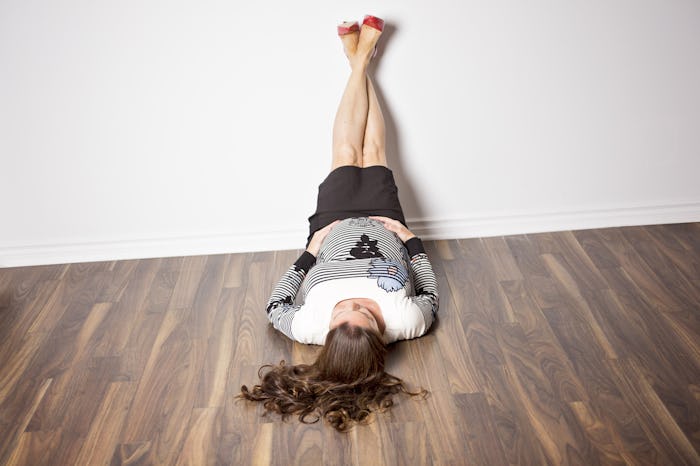Life

Here's Why You Shouldn't Wear High Heels When You're Pregnant, According To Experts
It's hard to feel like your former self when you're carrying a bowling ball in your stomach. To make matters worse, pregnancy has a tendency to change your fashion choices, and for a lot of practical reasons including but not limited to: swollen feet, nausea, weight gain, impromptu sweating, and difficulty walking. Still, some women will sacrifice comfort for style and insist on wearing high heels when they're growing a human inside their body. But is it safe to wear high heels when you're pregnant? Or is this one of those fun things you've got to table for a while and until your baby arrives? You know, like brunch mimosas and such.
The main issue that the high heel presents to a pregnant woman is that walking in the high heel can give her an unsteady gate, resulting in a fall. The experts seem to agree. Dr. Jennifer Shu, a pediatrician and co-author of the books Heading Home With Your Newborn and Food Fights, tells the website BabyCenter that high heels are "generally not a good idea." According to Dr. Shu, even wide-based clunky heels aren't great to wear when pregnant, because they still don't change the fact that your weight increases and your body shape and center of gravity change, which all can result in you having a less steady gait and can, in turn, increase your risk of falling.
Another reason health care professionals caution against wearing high heels when you're expecting is because this particular shoe can exacerbate pregnancy-related back pain. The American Congress of Obstetrics and Gynecologists (ACOG) explains on their website how, as pregnancy progresses and you carry more weight in your stomach (which is at the front of your body), you naturally bend forward. Your posture changes to help accommodate your weight and to keep your balance. Leaning backward — a standard pregnant woman stance — can cause strain on your back. And high heels, ACOG points out, are not an ideal shoe for pregnant women with back pain. Plus, as ACOG explains, heels can make matters worse by causing you to be even further off balance and (again) increase your risk of falling.
So what about this falling business? What if you did fall when you were pregnant? What kind of risks would that pose to you and your baby? According to the Mayo Clinic's website, your uterus does a super job at protecting your baby, so a fall would have to be quite severe to cause damage. The walls of your uterus are thick, plus you have amniotic fluid serving as a cushion. A fall later in pregnancy could be cause for concern, though, because there is the possibility that it could put you into labor or cause early delivery. The Mayo Clinic's website outlines symptoms to look out for after a fall that should alert you to seek immediate medical attention, including bleeding, leaking of amniotic fluid, uterine contractions, and decrease in fetal movement.
High heels in general are frowned upon by the medical community for the toll that they take on the body, regardless of whether or not you're pregnant. Dr. Sajid A. Surve, co-director of the Texas Center for Performing Arts Health and an associate professor at the University of North Texas Health Science Center Texas College of Osteopathic Medicine, tells the American Osteopathic Association (AOA) in an article about the harm of heels, saying:
"High heels put the foot at an angle and pull muscles and joints out of alignment, so the effects aren’t limited to the feet."
Dr. Surve goes on to explain that people who wear high heels regularly tend have pain in their lower back, neck, and shoulders, because of how the shoes affect the body's natural shape.
Taking into account the damage that wearing heels does to any body (not just pregnant bodies), the risk that they pose to making a pregnant woman even more off balance, and the potential they can cause for even more back pain, it seems pretty clear that you should say sayonara to stilettos when you're in the later (heavier) stages of your pregnancy. Of course, if you're newly pregnant-ish, heels are probably not terrible, but as always, talk to your doctor before doing anything you consider risky.